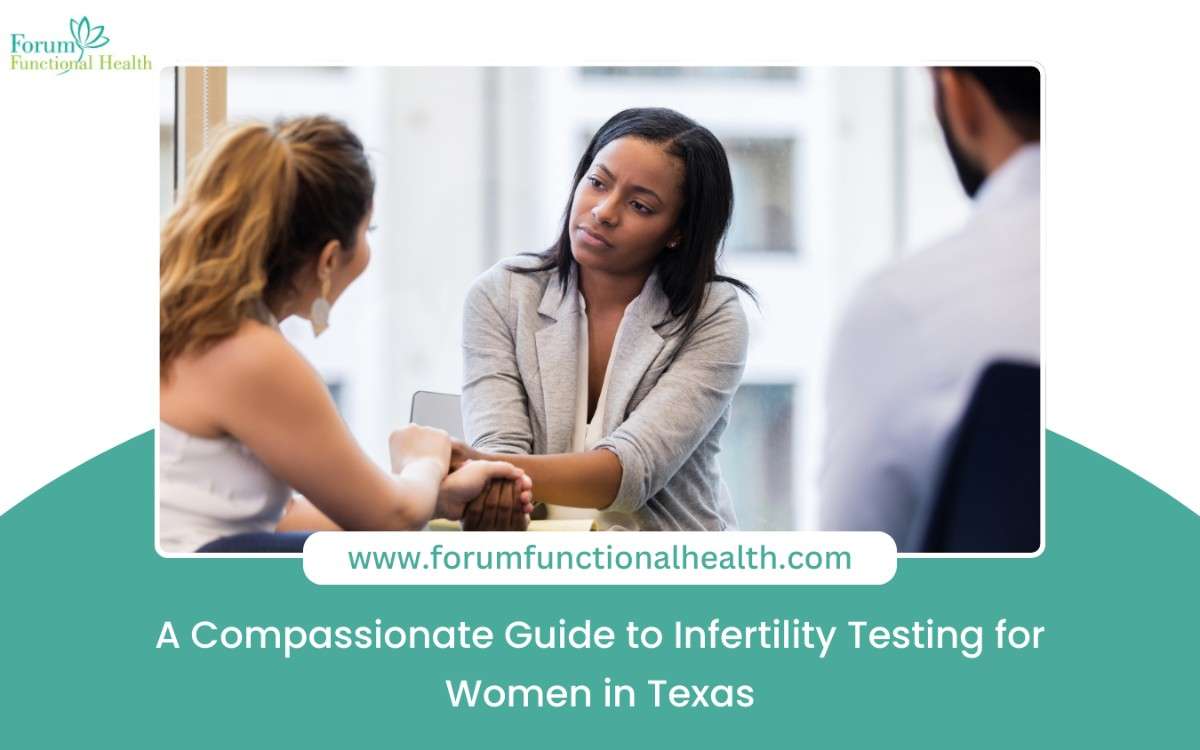A Compassionate Guide to Infertility Testing for Women in Texas

Infertility is a deeply personal and often emotionally challenging journey. For many women in Texas, the road to parenthood is filled with questions, uncertainty, and a desire for answers. At Forum Functional Health, we believe that compassionate, thorough care is the foundation of effective fertility support. If you\’re seeking infertility testing for women in Texas, this guide will walk you through everything you need to know—step by step—with clarity and empathy.
Understanding Infertility: You Are Not Alone
Infertility affects 1 in 8 couples in the United States. For women, it can stem from a variety of causes—hormonal imbalances, ovulation disorders, structural abnormalities, or underlying health conditions. Despite how common it is, many women feel isolated or unsure of where to begin.
The good news? Infertility testing for women in Texas is more advanced and accessible than ever, and the first step to clarity is just a conversation away.
When Should You Consider Infertility Testing?
If you’ve been trying to conceive for over a year without success (or six months if you\’re over 35), it’s time to consider testing. Additionally, testing is recommended sooner if you have:
- Irregular or absent menstrual cycles
- A history of pelvic inflammatory disease or endometriosis
- Prior miscarriages
- Thyroid or hormonal disorders
- Concerns about age-related fertility decline
Seeking care early can save time, reduce stress, and improve your chances of conception.
What to Expect from Infertility Testing
At Forum Functional Health, we prioritize a personalized and holistic approach. Infertility testing for women in Texas includes a combination of the following diagnostics:
1. Comprehensive Medical History & Lifestyle Assessment
We begin by understanding your full health picture—including diet, stress levels, sleep patterns, menstrual cycle history, and any previous fertility treatments or diagnoses.
2. Hormonal Blood Panels
Hormones play a pivotal role in fertility. Testing may include:
- Follicle Stimulating Hormone (FSH)
- Luteinizing Hormone (LH)
- Estradiol (E2)
- Thyroid hormones
- Prolactin
- Anti-Müllerian Hormone (AMH)
These provide insights into ovarian reserve, ovulatory function, and potential hormonal imbalances.
3. Pelvic Ultrasound
This non-invasive scan assesses the uterus and ovaries, identifying potential issues like fibroids, polycystic ovaries, or structural anomalies that could impact conception.
4. Hysterosalpingography (HSG)
This specialized X-ray evaluates the uterus and fallopian tubes to check for blockages or abnormalities that may interfere with egg and sperm meeting.
5. Ovulation Tracking
Through temperature charting, hormone tests, or ultrasound monitoring, we determine whether and when ovulation is occurring.
Why Choose Forum Functional Health for Fertility Testing?
Our team is dedicated to empowering women through integrative, root-cause-focused care. Unlike one-size-fits-all fertility clinics, we take time to understand your whole health—not just your reproductive system.
At Forum Functional Health, infertility testing for women in Texas is not just about lab work. It’s about building trust, addressing emotional and physical well-being, and guiding you toward a plan of action that’s uniquely yours.
Next Steps After Testing
Once your results are in, we walk you through them clearly and compassionately. Based on your diagnosis, we may recommend:
- Hormonal therapies
- Nutritional and lifestyle changes
- Stress and sleep optimization
- Natural supplements
- Referrals for IUI or IVF if necessary
Together, we create a path forward—with hope, support, and science behind every decision.
Your Fertility Journey Starts with Understanding
Whether you’ve just begun trying or have been struggling for some time, know this: you deserve answers, support, and a team that sees the full picture. Infertility testing for women in Texas doesn\’t have to be overwhelming. With the right guidance, it can be a powerful first step toward your future family.
Let’s take that first step together.
